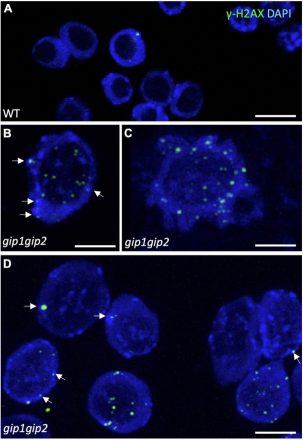Maintenance of the genome integrity is essential in eukaryotes. In animals, this maintenance is done in particular via mechanisms taking place at the periphery of the cell nucleus. In this work, researchers from Marie-Édith Chabouté‘s team discovered, using molecular and cellular biology approaches in the model plant Arabidopsis thaliana, that the small GIP regulatory proteins located on either side of the nuclear envelope actively participated in the control of genomic maintenance at the periphery of the nucleus. The functional impact of this involvement is particularly obvious in GIP mutants through the abnormal accumulation of double-strand breaks at the DNA level, leading to the constitutive activation of certain repair pathways including homologous recombination. The researchers also observed in these same mutants an alteration in the spatio-temporal localization of a key protein in the recombination process, the recombinase RAD51. This work reinforces the essential contribution of the nuclear periphery in the functional spatio-temporal organization of the genome in plants. This study is published in Frontiers in Plant Science.
 Visualisation of DNA damage by immunohistochemistry using agamma-H2AX antibody in wild-type Arabidopsis thaliana (WT) plants and in the double mutant for GIP proteins (gip1gip2).
Visualisation of DNA damage by immunohistochemistry using agamma-H2AX antibody in wild-type Arabidopsis thaliana (WT) plants and in the double mutant for GIP proteins (gip1gip2).















